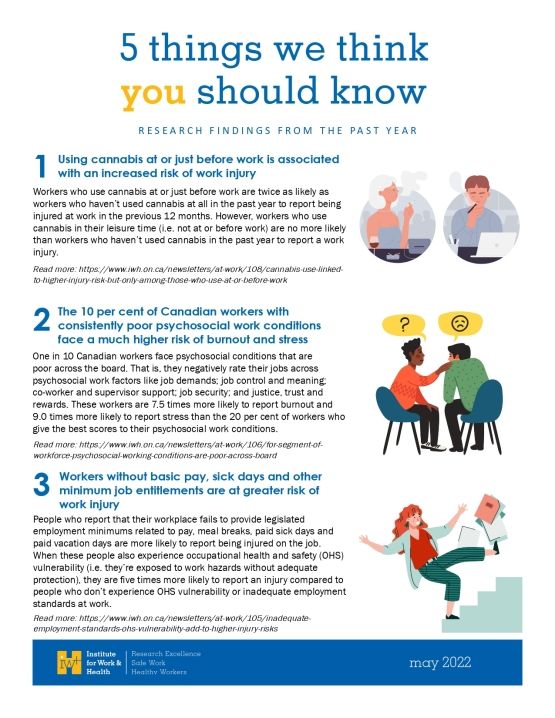
Using cannabis at or just before work is associated with an increased risk of work injury
Workers who use cannabis at or just before work are twice as likely as workers who haven’t used cannabis at all in the past year to report being injured at work in the previous 12 months. However, workers who use cannabis in their leisure time (i.e. not at or before work) are no more likely than workers who haven’t used cannabis in the past year to report a work injury.

The 10 per cent of Canadian workers with consistently poor psychosocial work conditions face a much higher risk of burnout and stress
One in 10 Canadian workers face psychosocial conditions that are poor across the board. That is, they negatively rate their jobs across psychosocial work factors like job demands; job control and meaning; co-worker and supervisor support; job security; and justice, trust and rewards. These workers are 7.5 times more likely to report burnout and 9.0 times more likely to report stress than the 20 per cent of workers who give the best scores to their psychosocial work conditions.

Workers without basic pay, sick days and other minimum job entitlements are at greater risk of work injury
People who report that their workplace fails to provide legislated employment minimums related to pay, meal breaks, paid sick days and paid vacation days are more likely to report being injured on the job. When these people also experience occupational health and safety (OHS) vulnerability (i.e. they’re exposed to work hazards without adequate protection), they are five times more likely to report an injury compared to people who don’t experience OHS vulnerability or inadequate employment standards at work.

Physically strenuous work does not necessarily bring the benefits of exercise to workers—and may even be bad for them
Emerging research shows an association between physically demanding work and health problems such as heart disease and diabetes—and even early death. Some call this association the “physical activity paradox” because it seems to run counter to the association between exercise and better health. However, physically demanding work, involving prolonged standing, heavy lifting, and awkward and static postures, is not the same as exercise or resistance training.

Over one-third of emergency department visits for a work-related injury don’t show up as workers’ compensation claims
About 35 to 40 per cent of emergency department visits for the treatment of work-related injuries or illnesses in Ontario don’t show up as compensation claims in the records of the province’s Workplace Safety and Insurance Board. This degree of under-reporting is consistent with other research showing that between 40 and 60 per cent of potentially compensable conditions are typically not reported to provincial compensation authorities in Canada.
